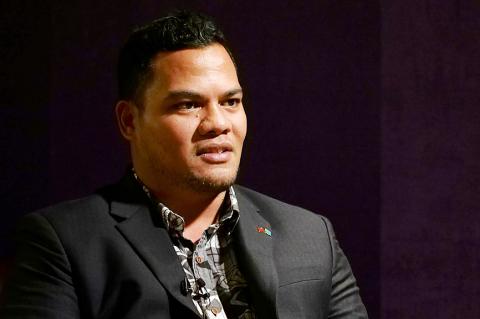Tuvalu has rejected offers from Chinese companies to build artificial islands to help it cope with rising sea levels, Tuvaluan Minister for Justice, Communication and Foreign Affairs Simon Kofe said yesterday, an approach viewed as undermining Taiwan’s influence in the region
Instead, Kofe explicitly expressed support for Taiwan and said that Tuvalu is working on establishing a group uniting Taipei’s four remaining allies in the Pacific.
“Tuvalu and Taiwan diplomatic ties are strongest they’ve ever been,” Kofe told reporters in an interview in Taipei.

Photo: Fabian Hamacher, Reuters
“We believe in the power of grouping together and collaborating,” he added, referring to the Marshall Islands, Palau and Nauru, as well as Tuvalu. “Together with our partners, we will be able to counter the influence from mainland China.”
The show of support provides some relief for President Tsai Ing-wen (蔡英文), who is seeking re-election on Jan. 11 and has seen seven countries drop Taiwan as a diplomatic ally since she took office in May 2016.
Tuvalu’s support came just two months after fellow Pacific nations Kiribati and the Solomon Islands switched their diplomatic recognition to China.
Beijing has over the past few months stepped up a campaign to peel away more of Taiwan’s allies.
Taipei has said that Kiribati was lured by Beijing with the promise of airplanes, while the Solomon Islands was offered development funds.
Kofe said that Chinese companies had approached local communities to help support a US$400 million Tuvaluan government plan to build artificial islands, adding that he believed the companies were backed by the Chinese government.
“It’s a no from us,” Kofe told reporters. “We are hearing a lot of information about debt, China buying our islands and looking at setting up military bases in our part of the world. Those are things that are concerning to us.”
“We hope those are lessons for other countries to be careful and be conscious of those negative impact... It’s not good for our Pacific fellow brothers and sisters,” he added.
China’s moves to expand its influence in the Pacific have alarmed the US and its allies, particularly Japan, Australia and New Zealand, which have dominated the strategic waters of the small developing nations since World War II and are pushing back against Beijing’s moves.
The premier of the Solomon’s Malaita Province yesterday told reporters that the US and its regional allies have pledged to develop a deep-sea port and would be invited to patrol its territory, creating a beachhead against increased Chinese investment.

US PUBLICATION: The results indicated a change in attitude after a 2023 survey showed 55 percent supported full-scale war to achieve unification, the report said More than half of Chinese were against the use of force to unify with Taiwan under any circumstances, a survey conducted by the Atlanta, Georgia-based Carter Center and Emory University found. The survey results, which were released on Wednesday in a report titled “Sovereignty, Security, & US-China Relations: Chinese Public Opinion,” showed that 55.1 percent of respondents agreed or somewhat agreed that “the Taiwan problem should not be resolved using force under any circumstances,” while 24.5 percent “strongly” or “somewhat” disagreed with the statement. The results indicated a change in attitude after a survey published in “Assessing Public Support for (Non)Peaceful Unification

The CIA has a message for Chinese government officials worried about their place in Chinese President Xi Jinping’s (習近平) government: Come work with us. The agency released two Mandarin-language videos on social media on Thursday inviting disgruntled officials to contact the CIA. The recruitment videos posted on YouTube and X racked up more than 5 million views combined in their first day. The outreach comes as CIA Director John Ratcliffe has vowed to boost the agency’s use of intelligence from human sources and its focus on China, which has recently targeted US officials with its own espionage operations. The videos are “aimed at

SHIFT: Taiwan’s better-than-expected first-quarter GDP and signs of weakness in the US have driven global capital back to emerging markets, the central bank head said The central bank yesterday blamed market speculation for the steep rise in the local currency, and urged exporters and financial institutions to stay calm and stop panic sell-offs to avoid hurting their own profitability. The nation’s top monetary policymaker said that it would step in, if necessary, to maintain order and stability in the foreign exchange market. The remarks came as the NT dollar yesterday closed up NT$0.919 to NT$30.145 against the US dollar in Taipei trading, after rising as high as NT$29.59 in intraday trading. The local currency has surged 5.85 percent against the greenback over the past two sessions, central

STEADFAST FRIEND: The bills encourage increased Taiwan-US engagement and address China’s distortion of UN Resolution 2758 to isolate Taiwan internationally The Presidential Office yesterday thanked the US House of Representatives for unanimously passing two Taiwan-related bills highlighting its solid support for Taiwan’s democracy and global participation, and for deepening bilateral relations. One of the bills, the Taiwan Assurance Implementation Act, requires the US Department of State to periodically review its guidelines for engagement with Taiwan, and report to the US Congress on the guidelines and plans to lift self-imposed limitations on US-Taiwan engagement. The other bill is the Taiwan International Solidarity Act, which clarifies that UN Resolution 2758 does not address the issue of the representation of Taiwan or its people in